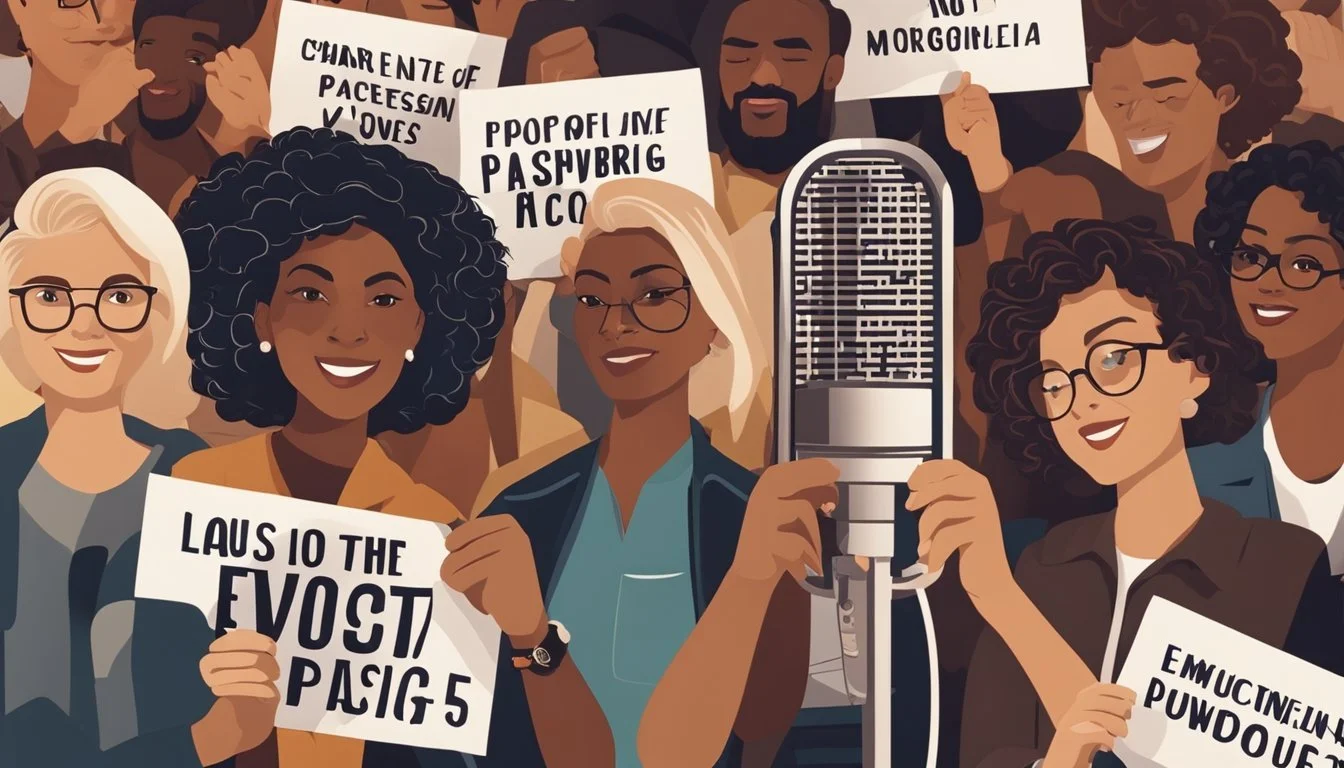Liz Garbus: Amplifying Voices of the Marginalized in Documentary Filmmaking
Liz Garbus, an acclaimed filmmaker and director, has dedicated much of her career to amplifying the voices of marginalized communities through compelling storytelling. Her work sheds light on societal issues that often go unnoticed, providing a platform for those who have long been silenced.
In films like "All In: The Fight for Democracy," Garbus exposes the structural barriers that disenfranchise marginalized groups, highlighting the ongoing struggle against systemic oppression. By focusing on personal stories within broader historical contexts, she creates a powerful narrative that resonates with diverse audiences.
Garbus’s approach underlines the importance of allyship and advocacy in creating an equitable future. Her films do more than just inform; they inspire viewers to question injustices and consider their roles in fostering social change.
Liz Garbus: Profile of a Documentary Filmmaker
Liz Garbus is a prolific American documentary filmmaker known for her compelling storytelling and focus on marginalized voices. This section delves into her early life, career beginnings, and unique thematic styles.
Early Life and Education
Elizabeth Freya Garbus was born on April 11, 1970. She grew up in New York City, nurtured by an environment that valued the arts and intellectual pursuits. Garbus attended Brown University, where she developed her passion for documentary filmmaking. With a strong educational foundation, she embarked on a journey to use film as a medium for social change.
Career Beginnings and Breakthrough
Garbus co-founded Moxie Firecracker Films with her long-time collaborator, Rory Kennedy. Her early work, The Farm: Angola, USA (1998), co-directed with Jonathan Stack, earned critical acclaim and multiple awards. This documentary highlighted the conditions in Louisiana's notorious maximum-security prison. Garbus' career breakthrough came with What Happened, Miss Simone? (2015), a Netflix production exploring the life of singer Nina Simone, which earned an Academy Award nomination.
Themes and Styles
Garbus often tackles themes related to social justice, personal struggle, and historical retrospection. Her documentaries like Bobby Fischer Against the World and Ghosts of Abu Ghraib reflect her sensitivity to complex characters and situations. She blends archival footage with in-depth interviews, creating a narrative that is both informative and emotionally engaging. Her style is marked by meticulous research and a balanced portrayal of her subjects' lives, driving home the importance of giving voice to the marginalized.
Amplifying Marginalized Voices
Liz Garbus is renowned for her commitment to highlighting underrepresented communities. This involves choosing impactful stories, collaborating closely with those communities, and monitoring the reception of her work.
Selecting Stories and Subjects
Garbus demonstrates a keen eye for stories that matter. She seeks out narratives that often go unnoticed, ensuring that the struggles and triumphs of marginalized groups are brought to the forefront. Her selection process is meticulous, involving extensive research and engagement with the subject matter. This approach not only educates her audience but also evokes empathy, making the unheard heard and seen.
Collaboration with Communities
Garbus emphasizes authentic representation by working directly with the communities she highlights. This collaboration ensures that the voices of the marginalized are authentically captured and portrayed. By involving community members in the storytelling process, she avoids misrepresentation and empowers those individuals to tell their stories. This participatory approach helps build trust and ensures the integrity of the narrative.
Impact and Reception
The impact of Garbus’s work is significant. Her films and documentaries are not only critically acclaimed but also serve as catalysts for social change. Audiences are moved to action, whether through increased awareness or direct involvement in advocacy efforts. The reception of her work underscores its importance, gaining attention from both public and critics alike, thus amplifying the voices she seeks to empower.
Notable Works and Accolades
Liz Garbus has built an impressive career in documentary filmmaking, distinguished by her deep exploration of social issues and personal narratives. Key films and numerous awards highlight her contributions to the field.
Critically Acclaimed Films
Liz Garbus is known for a series of documentaries that critically examine complex and pressing social issues. What Happened, Miss Simone?, released in 2015, offered a poignant look into the life of singer Nina Simone, earning an Academy Award nomination.
Her 1998 film The Farm: Angola, USA, which delves into the lives of inmates at the Louisiana State Penitentiary, received critical acclaim and was nominated for both an Academy Award and an Emmy. Another notable work is All In: The Fight for Democracy, co-directed with Lisa Cortés, which sheds light on voter suppression in America. Garbus’s keen eye for detail and narrative depth has made these films significant contributions to documentary cinema.
Awards and Recognition
Garbus's work has not only garnered critical acclaim but also numerous awards. She won the Best Director award at the Sundance Film Festival for Bobby Fischer Against the World. For Ghosts of Abu Ghraib, she received a Primetime Emmy Award.
What Happened, Miss Simone? was nominated for both an Academy Award and a Grammy, demonstrating her ability to transcend multiple platforms with her storytelling. Additionally, The Farm: Angola, USA received an Emmy Award for Outstanding Non-Fiction Special. Throughout her career, Garbus has continually been recognized by her peers and prestigious institutions alike, cementing her reputation as a leading figure in documentary filmmaking.
Advocacy and Activism
Liz Garbus is known for her unwavering dedication to amplifying the voices of marginalized communities through various forms of advocacy and activism. Her work spans both social justice filmmaking and public speaking engagements, creating platforms for essential dialogue and awareness.
Social Justice Filmmaking
Liz Garbus has directed numerous documentaries that highlight pressing social issues. Her films often focus on stories that mainstream media overlooks, bringing attention to the struggles and resilience of marginalized groups. For instance, her documentary "What Happened, Miss Simone?" delves into the life of Nina Simone, exploring themes of racial and gender inequality. By shedding light on these narratives, Garbus not only informs audiences but also inspires action and empathy.
Her ability to capture raw, unfiltered human experiences sets her work apart. This approach fosters a deeper connection between the subject and the viewer, driving home the importance of societal change. Garbus’s meticulous research and powerful storytelling techniques serve as a catalyst for recognizing and addressing systemic issues.
Public Speaking and Panels
Beyond filmmaking, Garbus actively participates in public speaking engagements and panels. These forums provide her with the opportunity to share her insights on the intersection of media and social justice. Often invited to academic institutions and industry conferences, she speaks on the role of documentary filmmaking in advocacy.
During these sessions, Garbus discusses her methodologies and the ethical considerations involved in documenting real-life events. She addresses the challenges of portraying sensitive topics while maintaining the subject's dignity and truth. By engaging with the public and fellow professionals, Garbus advocates for a responsible approach to storytelling that honors and uplifts marginalized voices.
Her contributions extend to leading workshops and seminars where she mentors emerging filmmakers. These interactions not only educate but also empower the next generation to use their craft for meaningful impact.
Industry Influence and Leadership
Liz Garbus is recognized for her profound impact on the documentary film industry. Her role as a mentor and her significant contributions have paved the way for emerging filmmakers while reshaping the landscape of documentary filmmaking.
Mentorship and Support for Emerging Filmmakers
Garbus contributes significantly to nurturing new talent. Through her production company, she provides resources and platforms for up-and-coming filmmakers. Her focus on inclusivity ensures diverse voices find representation.
She offers direct mentorship, sharing her expertise and network. This guidance fosters a new generation of filmmakers who are equipped with the skills and confidence needed to succeed.
Garbus actively participates in workshops and panels, driving conversations around best practices and innovative storytelling techniques.
Contribution to Documentary Film Industry
Garbus has directed and produced numerous acclaimed documentaries. Her works often spotlight social issues, giving voice to marginalized communities.
Her innovative approach combines historical footage with contemporary narratives, engaging a wide audience and enhancing public discourse.
Her films have garnered prestigious awards, highlighting her ability to tell compelling stories that inspire change.
Garbus’ leadership extends to advocating for fairer industry practices. She emphasizes ethical storytelling and accurate representation, influencing industry standards and encouraging a more inclusive environment.
Challenges and Controversies
Liz Garbus is a prominent filmmaker known for amplifying the voices of marginalized communities through her work. Despite her contributions, her approach faces several challenges and controversies.
One significant challenge lies in accurately representing marginalized voices without appropriating their stories. Ensuring authentic representation requires collaboration and sensitivity, which is often difficult to balance.
Garbus's documentaries sometimes attract criticism for their portrayal of complex social issues. Detractors argue that her films can be seen as exploitative, focusing on dramatic elements to capture audience attention. This criticism raises concerns about ethical storytelling practices.
The funding and distribution of documentaries addressing marginalized communities can be problematic. Financial constraints often limit the reach and quality of such projects, affecting their impact and accessibility.
Moreover, Garbus's work occasionally faces censorship and political pushback. Topics related to marginalized groups can be contentious, leading to challenges in distribution and public reception. This resistance can stifle the conversation around these crucial subjects.
Despite these challenges, Garbus remains committed to her mission. The controversies highlight the ongoing dialogues necessary for ethical and impactful filmmaking in today's society.
Future Projects and Directions
Liz Garbus continues her influential work in amplifying marginalized voices. She is exploring documentary projects that highlight underrepresented communities and their stories. These projects aim to use the power of film to spark social change.
One of Garbus's upcoming projects focuses on environmental justice. She aims to shed light on how environmental issues disproportionately impact marginalized communities. The project will include interviews, on-the-ground footage, and expert testimonies.
Garbus is also considering a series on digital activism. Inspired by the use of communication technologies for social justice, this series will examine how marginalized groups use the Internet and social media to mobilize and advocate for their rights.
Another area of interest for Garbus is historical injustices. She plans to create documentaries that revisit ignored or forgotten aspects of history to provide a platform for those who were historically silenced.
Future Projects Focus Areas Environmental Justice Impact of environmental issues on marginalized communities Digital Activism Use of the Internet and social media for advocacy Historical Injustices Revisiting ignored or forgotten historical events
Garbus's future projects will undoubtedly continue to give a voice to those often unheard. Each project highlights her commitment to social justice and storytelling.
Conclusion
Liz Garbus has undeniably made significant strides in amplifying marginalized voices through her documentary work. Her films have shed light on vital social issues, from voter suppression to systemic injustices.
By highlighting personal stories and providing a platform for underrepresented communities, Garbus advances public awareness. Her commitment to inclusivity and equity in storytelling cannot be overstated.
Garbus's approach combines historical context with contemporary relevance, making her documentaries not only educational but also deeply engaging. Viewers gain insight into both past and present struggles, fostering a deeper understanding of the issues at hand.
Through her impactful projects, Liz Garbus exemplifies the power of media in driving social change.





